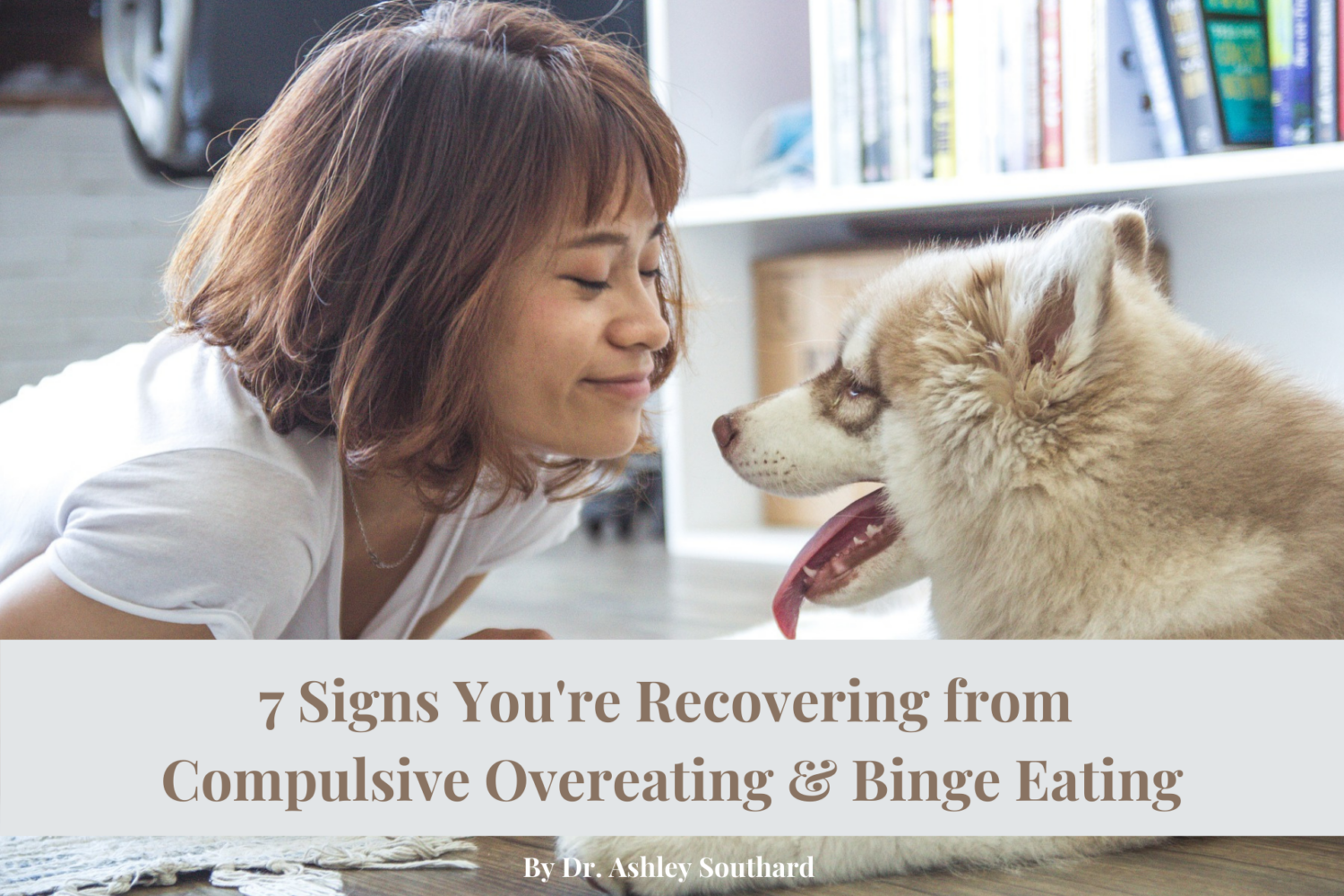7 Signs You’re Recovering from Compulsive Overeating & Binge Eating
by
If you are working to stop your Compulsive Overeating or Binge Eating, here are 7 common signs you are recovering:
#1: Binge episodes don’t feel as “good” as they once did.
 Before you begin the journey to recovery, binge episodes can feel so “good”…albeit, temporarily. Many people describe the episodes as soothing, comforting, anesthetizing, and numbing. The quick escape from pain, stress, and overwhelm is both addicting and intoxicating. (Of course, this good feeling often evaporates soon thereafter, replaced by shame, criticism, and self-loathing.)
Before you begin the journey to recovery, binge episodes can feel so “good”…albeit, temporarily. Many people describe the episodes as soothing, comforting, anesthetizing, and numbing. The quick escape from pain, stress, and overwhelm is both addicting and intoxicating. (Of course, this good feeling often evaporates soon thereafter, replaced by shame, criticism, and self-loathing.)
As you move through the journey to recovery, you begin to connect with all the feelings and triggers that historically led you straight into the pantry. This means you develop an awareness of what you’re feeling, why you’re feeling this way, and what your psyche is really needing to feel better (which rarely involves food).
You begin to realize that your problems with food really have nothing to do with food at all, and everything to do with your feelings. As a result, when you do fall back into this habitual pattern of compulsive overeating, the numbing you once felt is now replaced with an awareness of what’s really going on beneath the surface. And while it may take some time before your behavior syncs up with your growing awareness, you’re already wiser to the process.
#2: Your emotions don’t feel as scary or overwhelming.
 When you first begin the journey to recovery, you may feel very ill-equipped to fully experience your emotions. There is usually an overwhelming fear that if you truly allow yourself to feel what’s really going on inside, that the emotions will be so big and intense that they’ll completely take over, rendering you powerless and completely out of control.
When you first begin the journey to recovery, you may feel very ill-equipped to fully experience your emotions. There is usually an overwhelming fear that if you truly allow yourself to feel what’s really going on inside, that the emotions will be so big and intense that they’ll completely take over, rendering you powerless and completely out of control.
But as your awareness of what you’re feeling and what you’re needing slowly increases, so, too, does your ability to tolerate and “sit with” a wider range of emotions. You begin to notice that feeling things like anger or sadness are manageable, and that they don’t completely consume you. With time and practice, your confidence in feeling your feelings and responding to them effectively grows, until one day you find that you’re no longer turning to food in times of emotional distress and discomfort.
#3: You know that your eating is rooted in something deeper than food.
 On the surface, it may seem like binge eating is simply a matter of too little willpower when it comes to tasty food and/or a lack of knowledge about health. But like most vices, binge eating isn’t really about food at all; this “drug of choice” is simply a symptom of something deeper. Food has been used to disguise and disconnect from what’s really going on beneath the surface.
On the surface, it may seem like binge eating is simply a matter of too little willpower when it comes to tasty food and/or a lack of knowledge about health. But like most vices, binge eating isn’t really about food at all; this “drug of choice” is simply a symptom of something deeper. Food has been used to disguise and disconnect from what’s really going on beneath the surface.
As you move through your recovery journey, you learn that compulsive overeating and binge eating is a coping strategy that developed at an earlier time in your life when your natural ability to deal with whatever was going on was overpowered and overwhelmed. At this time, food stepped in to help you feel soothed and comforted in the face of distress.
Like many people affected by this behavior, you may be able to go back as far as 5 or 6 years old, recalling early times in your life when you found yourself eating in response to stress. Perhaps life felt very lonely and food was your friend. Or maybe life felt very scary and threatening and food brought much-needed relief. Additionally, maybe there was a pressure to look a certain way that set into motion a vicious binge-diet-binge-diet cycle.
Whatever your specific reason(s) may be, it’s important to remember that there is always a sound psychological reason for this eating behavior. Somewhere in your past, this behavior served to help and protect you, even though its consequences may be more apparent to you today.
Respecting the deeper emotional and psychological roots of your relationship with food is a cornerstone of the recovery process. For when you know why this behavior began, then you can begin to heal those emotional spaces inside.
#4: Diets feel significantly less tempting.
 As you connect with the deeper elements of your relationship with food – things like your feelings and your history – you will find yourself warming up to the idea that diets really don’t work. While you’ve probably heard that sentiment so many times before, this time it really starts to feel true for you. You can reflect on your history with dieting and see that diets have never offered long-term relief; in fact, they have likely done more harm than good when it comes to your health and your eating.
As you connect with the deeper elements of your relationship with food – things like your feelings and your history – you will find yourself warming up to the idea that diets really don’t work. While you’ve probably heard that sentiment so many times before, this time it really starts to feel true for you. You can reflect on your history with dieting and see that diets have never offered long-term relief; in fact, they have likely done more harm than good when it comes to your health and your eating.
As you continue this journey toward recovery, you may find yourself in the midst of grieving the loss of all those years spent dieting. “If only I had learned this sooner,” is a common sentiment expressed as people start to see diets for what they are, which can trigger feelings of anger and sadness. In the midst of this emotional processing, you may also find yourself at times still wanting to believe that maybe this diet or that plan can, in fact, work; but, thanks to your strength in recovery, you are able to let those thoughts pass on by without acting upon them.
This awareness that diets really don’t work is also a beautiful entrance into the world of Intuitive Eating, which offers a no-diet approach to food and body. Using your body’s natural hunger and fullness cues, you can begin to break out of the dieting mentality that dictates what you should eat, and gives you permission to come back home to your body so you can hear it when it tells you what it wants to eat. While this approach can be challenging to adopt at first, its “slow and steady” pace eventually reveals to you a calmer, more enjoyable relationship with food.
#5: You get annoyed when people talk about diets.
 With your newfound awareness of what overeating is really about coupled with the knowledge that diets are not at all helpful on this journey to full recovery, you may find yourself feeling less tolerant of others’ comments, stories, and questions about diets, “healthy” habits, and weight loss. This may be especially pronounced at the start of a new year when diets are the focus for many, at work when people share dieting tips and recipes, and/or at family gatherings when certain family members can’t stop talking about each other’s eating habits and weight changes.
With your newfound awareness of what overeating is really about coupled with the knowledge that diets are not at all helpful on this journey to full recovery, you may find yourself feeling less tolerant of others’ comments, stories, and questions about diets, “healthy” habits, and weight loss. This may be especially pronounced at the start of a new year when diets are the focus for many, at work when people share dieting tips and recipes, and/or at family gatherings when certain family members can’t stop talking about each other’s eating habits and weight changes.
As your recovery strengthens, you may find yourself actively responding to others’ diet talk and/or intentionally protecting yourself from these interactions. There are many ways to do this, including, but not limited to: asserting that you will not discuss diets or weight, educating your audience about intuitive eating, leaving the room when conversations about dieting begin, advocating for body positivity and acceptance, changing the subject, limiting your time spent with certain people, unfollowing diet-focused social media accounts, and/or not attending certain events where you know diet talk will abound.
#6: You are more accepting of your body and weight.
 When you first start the recovery process, you may be primarily motivated by the very popular goal of losing weight. Getting your compulsive overeating “under control” seems like it will be the magic bullet to changing not only how your body looks and feels, but how joyful and confident you feel within yourself. This is, after all, what diet culture teaches us all to believe.
When you first start the recovery process, you may be primarily motivated by the very popular goal of losing weight. Getting your compulsive overeating “under control” seems like it will be the magic bullet to changing not only how your body looks and feels, but how joyful and confident you feel within yourself. This is, after all, what diet culture teaches us all to believe.
But as you embrace the deeper psychological roots of this process and develop compassion for a younger version of yourself that needed food to cope, you may find this compassion generalizing to your Body Self. As a result, you may begin to feel more tolerant and accepting of the wonderful body you have today. You may delight in its abilities, strengths, and resilience, especially when you consider all that it’s been through with dieting and bingeing. You may notice that your weight becomes a bit less important to you, replaced by a sacred focus on how you feel, both emotionally and physically. These are all telltale signs that you are becoming an empowered anti-dieter who is beginning to believe that your body and weight have no bearing on your self-worth!
For some, this shift does not necessarily mean that you no longer care about your physical appearance or that you no longer desire a weight change; those goals may remain firmly intact. But what is different is your motivation behind these desired changes. They are no longer fueled by shame, hatred, and self-loathing; instead, they are pursued with the spirit of compassion, kindness, and self-love. As a result, you may find yourself doing things like buying new clothes that fit your body well, rather than refusing to “give in” to your body’s changes and wearing ill-fitted clothes. Or eating a more nutritious meal because that’s what sounds delicious to you today, not because it makes you a “good” eater. Or taking yourself on a leisurely walk at sunset because the experience is joyful, rather than forcing yourself to exercise because you don’t want to be “lazy.” Decisions are now made from a place of accepting and nurturing your body, not punishing and shaming it.
#7: You prioritize your Self in your own life.
 Too often, the psychology underlying compulsive overeating and binge eating is largely rooted in early life experiences and subsequent beliefs that others come before you, their needs are more important, and you need to sacrifice your feelings and needs to keep the peace. You may describe yourself as a people-pleaser or peacekeeper, noting your incredible ability to make others happy and avoid conflict. Sadly, this ability comes at the expense of your own happiness and well-being, which will drive you right back into the kitchen for temporary emotional relief.
Too often, the psychology underlying compulsive overeating and binge eating is largely rooted in early life experiences and subsequent beliefs that others come before you, their needs are more important, and you need to sacrifice your feelings and needs to keep the peace. You may describe yourself as a people-pleaser or peacekeeper, noting your incredible ability to make others happy and avoid conflict. Sadly, this ability comes at the expense of your own happiness and well-being, which will drive you right back into the kitchen for temporary emotional relief.
The journey to recovery is really a journey of coming home to your Self. Reconnecting with your feelings and your needs, and putting yourself back into the equation. You begin to ask yourself – What do I want? What sounds good to me? What will work for me right now? You start to pay attention to what feels good and doesn’t feel good to you, and what you prefer in any given situation. This translates into knowing what food sounds good to you for a meal, what movements your body might enjoy today, what experiences you’d like to have, and what requests or invitations simply won’t work for you. You also notice an increasing comfort with using your voice to ask for what you want and need, and an improved ability to assert boundaries when needed. Most importantly, you consider yourself before factoring in what everyone else prefers or expects. You are experiencing the joy of living from a place in which you truly believe, “I am enough.”
Full Recovery from compulsive overeating and binge eating is absolutely possible! Digging into the not-so-obvious, deeper psychological roots and healing your Self from the inside out is the key. For when you do “The Deeper Work” and learn to approach your whole Self ~ mind, body, and soul ~ with loving kindness, your psyche will no longer need dis-order to cope.
 Dr. Ashley Southard is the Site Director and Clinical Therapist at A New Beginning in Scottsdale, AZ, Co-Founder of TheHealthyWeighOut Emotional & Binge Eating Program, and Co-Host of Circle of HOPE Online Recovery Community for Emotional & Binge Eating. She specializes in the treatment of complex trauma, eating disorders, and relationship issues. You can follow her on Instagram and Facebook, and watch her YouTube channel all about Emotional and Binge Eating.
Dr. Ashley Southard is the Site Director and Clinical Therapist at A New Beginning in Scottsdale, AZ, Co-Founder of TheHealthyWeighOut Emotional & Binge Eating Program, and Co-Host of Circle of HOPE Online Recovery Community for Emotional & Binge Eating. She specializes in the treatment of complex trauma, eating disorders, and relationship issues. You can follow her on Instagram and Facebook, and watch her YouTube channel all about Emotional and Binge Eating.







